At its July 14 virtual meeting, Chapel Hill's Community Policing Advisory Committee heard two presentations about clinically based policing alternatives and discussed its role in light of a recent Chapel Hill Town Council resolution to work toward racial equity.
Committee member Paris Miller said she hopes the group’s upcoming roundtable with council members and community stakeholders, which is tentatively planned for early August, will provide some clarity on the role of CPAC in light of a Town resolution passed in late June. The resolution aimed to "ensure the safety of Black and brown lives" through improved public safety measures, such as banning the use of chokeholds within the Chapel Hill Police Department and eliminating regulatory traffic stops.
“That’s going to be part of the discussion, in terms of what CPAC looks like moving forward, and how we can advise the Town Council on how we want to move forward and what our charge is, and possibly have some review of that and get some community input," Miller said.
Tai Huynh, the Town Council’s liaison to CPAC, said the committee's role should change as the community changes, and the committee should have a part in redefining that role.
“We as a Town Council would like to have CPAC as a part of that process, of kind of clarifying CPAC’s role and that charge,” Huynh said.
Presented proposal
At the meeting, Caitlin Fenhagen, the criminal justice resource director for Orange County, presented a proposal meant to “reduce interaction with the criminal justice system altogether” for 25 to 30 individuals in Orange County who Fenhagen said are “revolving in and out of our criminal justice system” with largely low-level offenses.
“They are literally coming in and coming out, then they’re missing court, and the cycle starts all over again,” Fenhagen said. “Or, alternatively, they’re coming into our jail and in order to get out of jail and resolve their case, they’re accepting a plea and getting yet another conviction on their record.“
Under this proposal, two peer support specialists with lived experience of homelessness, drug abuse or mental health would be embedded in the community to help connect individuals with housing and other resources. The proposal also includes an additional clinical social worker position to manage cases diverted from law enforcement.




